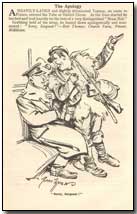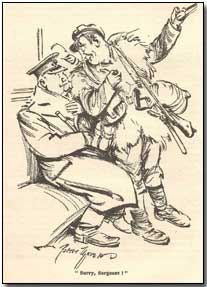Memoirs & Diaries - The Best 500 Cockney War Stories - The Apology and Other Stories
 Published in London
in 1921, The Best 500 Cockney War Stories
comprised, in the words of its newspaper publisher (The London Evening
News) "a remembering and retelling of those war days when laughter
sometimes saved men's reason".
Published in London
in 1921, The Best 500 Cockney War Stories
comprised, in the words of its newspaper publisher (The London Evening
News) "a remembering and retelling of those war days when laughter
sometimes saved men's reason".
The collection of short memoirs, some 500 in total, is divided into five categories - Action, Lull, Hospital, High Seas and Here and There. This page contains five stories from Here and There, led by The Apology.
Other sections within the collection can be accessed using the sidebar to the right.
The Apology
A heavily-laden and slightly intoxicated Tommy, en route to France, entered the Tube at Oxford Circus.
As the train started he lurched and trod heavily on the toes of a very distinguished "Brass Hat."
Grabbing hold of the strap, he leaned down apologetically and murmured: "Sorry, Sergeant!"
Bert Thomas, Church Farm, Pinner, Middlesex
Too Scraggy
We were prisoners in the infamous Fort Macdonald, near Lille, early in May 1917, rammed into the dungeons there for a sort of "levelling down process," i.e. starvation, brutal treatment, and general misery.
After eleven days of it we were on our way, emaciated, silent, and miserable, to the working camps close behind the German lines, when a Cockney voice piped up:
"Nah then, boys, don't be down 'earted. They kin knock yer abaht and cut dahn yer rations, but, blimey, they won't eat us - not nah!"
G. F. Green, 14 Alma Square, St. John's Wood, N.W.8
So Why Worry?
The following, written by a London Colonel, was hung up in one of our dug-outs:
"When one is a soldier, it is one of two things. One is either in a dangerous place, or a cushy one. If in the latter, there is no need to worry. If one is in a dangerous place, it is one of two things. One is wounded, or one is not. If one is not, there is no need to worry. If the former, it is either dangerous or slight. If slight, there is no need to worry, but if dangerous, it is one of two alternatives. One dies or recovers. If the latter, why worry? If you die you cannot. In these circumstances the real Tommy never worries."
"Alwas," Windmill Road, Brentford, Middlesex
Commended by the Kaiser
As prisoners of war we were unloading railway sleepers from trucks when a shell dump blew up.
German guards and British prisoners scattered in all directions. Some of the Germans were badly wounded and, as shells continued to explode, no attempt was made by their comrades to succour them.
Seeing the plight of the wounded, a Cockney lad called to some fellow-prisoners crouching on the ground, "We can't leave 'em to die like this. Who's coming with me?"
He and others raced across a number of rail tracks to the wounded men and carried them to cover.
For this act of bravery they were later commended by the then Kaiser.
C. H. Porter (late East Surrey Regiment), 118 Fairlands Avenue, Thornton Heath, Surrey
Only Fog Signals
We were resting in Poperinghe in December 1915.
One morning about 4.30 a.m. we were called out and rushed to entrain for Vlamertinghe because Jerry was attacking. The train was packed with troops, and we were oiling our rifle bolts and checking our ammunition to be ready for action.
We had not proceeded far when Jerry started trying to hit the train with some heavy shells. Several burst very close to the track.
There was one young chap in our compartment huddled in a corner looking rather white.
"They seem to be trying to hit the train," he said.
"Darkie" Webb, of Poplar, always cheerful and matter-of-fact, looked across at the speaker and said, "'It the train? No fear, mate, them's only signals; there's fog on the line."
B. Pigott (late Essex Regt.), 55 Burdett Avenue, Westcliff-on-Sea
Next - An American Hustle and four other stories
A "Bangalore Torpedo" was an explosive tube used to clear a path through a wire entanglement.
- Did you know?

